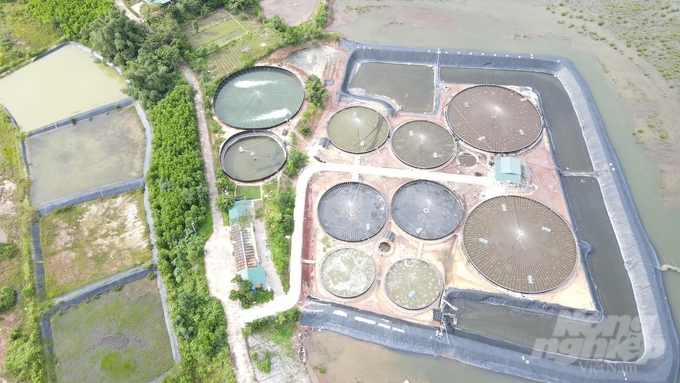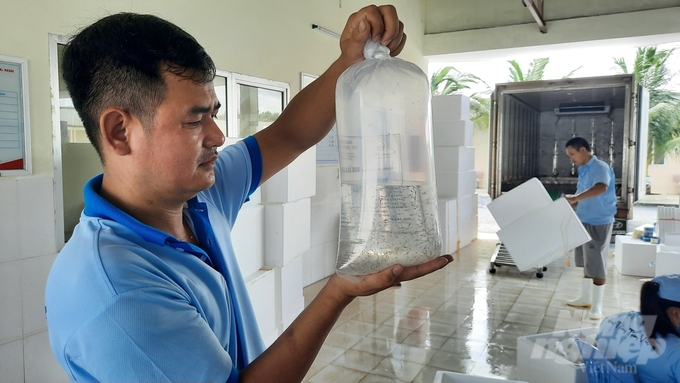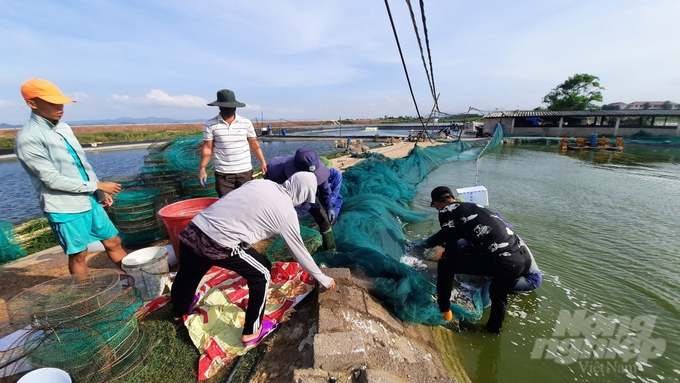June 20, 2025 | 16:00 GMT +7
June 20, 2025 | 16:00 GMT +7
Hotline: 0913.378.918
June 20, 2025 | 16:00 GMT +7
Hotline: 0913.378.918

High-tech industrial whiteleg shrimp farming model in Cong Hoa commune, Cam Pha city. Photo: Nguyen Thanh.
Quang Ninh province features outstanding advantages in marine economic development, especially in the fisheries sector, with an average annual growth rate of 6.6%. Accordingly, Resolution No. 13-NQ/TU on developing the fisheries economy in Quang Ninh province until 2020, with a vision towards 2030 has been effectively implemented, meeting the goal of the agricultural restructuring.
The high-tech shrimp farm belonging to Mr. Vu Dinh Quyen in Cong Hoa commune, Cam Pha city is frequented by convoys of 1-ton shrimp transportation trucks. "The weather was favorable in 2022, so every shrimp farmer was excited," shared Mr. Quyen as he harvested shrimp with cooperative members.
Mr. Quyen's high-tech shrimp farming model produced 20 tons of shrimp and generated a revenue of approximately 4 billion VND in 2022.
Many farmers in Quang Ninh province are currently utilizing various shrimp farming models, such as multi-stage farming, Biofloc technology, VietGAP-compliant models, and farming in greenhouses. A high-tech whiteleg shrimp industrial farming model in Quang Yen, Dam Ha, and Mong Cai can produce an average yield between 20 and 25 tons per hectare per crop. Most notably, some models reached an average yield between 45 and 50 tons per hectare per crop.
Mr. Nguyen Van Dung from Binh Ngoc commune, Mong Cai city has experimented with intensive whiteleg shrimp farming since 2012. For his first crop, he harvested nearly 10 tons of commercial shrimp from 0.6 hectares. After deducting expenses, Mr. Dung earned a profit of nearly 600 million VND.
Tan An Seafood Joint Stock Company in Quang Yen Town dedicates 20 hectares to aquaculture, including 10 hectares of whiteleg shrimp farming following the 3-stage super-intensive farming model. Each year, the company produces between 600 and 800 tons of whiteleg shrimp, bringing in between 70 and 80 billion VND of profit.
The total shrimp farming area (including whiteleg and black tiger shrimp) in Quang Ninh province reached 7,000 hectares by 2022. Accordingly, the industrial shrimp farming area reached 4,700 hectares with an output of 23,000 tons. The shrimp farming productivity reached an average of 3.1 tons per hectare, which is an increase of 1.8 tons per hectare compared to that of 2013.
When Resolution No. 13 was implemented between the years 2013 and 2022, shrimp farming in Quang Ninh province made significant progress. The total area of shrimp farming in 2022 dropped by 18.2% compared to that of 2013, but the area converted from extensive farming to industrial farming has increased significantly. As a result, shrimp production in 2022 has increased by 246% compared to 2013.
Located in the planned high-tech agricultural zone for fisheries, Viet Uc Quang Ninh Co., Ltd in Tan Lap commune, Dam Ha district has invested in the construction and operation of 23 production farms. With over 400 shrimp hatcheries, the company has provided nearly 2 billion disease-free shrimp seeds to the Quang Ninh market, meeting over 30% of the demand for shrimp seeds in recent years.

Viet Uc Quang Ninh Co., Ltd provides high-quality and disease-free shrimp seeds. Photo: Nguyen Thanh.
Winter shrimp farming was previously impossible in Quang Ninh province because the cold weather severely inhibits the growth of shrimp. However, Viet Uc Quang Ninh's success in researching cold-resistant shrimp has allowed local farmers to increase their farming capacity.
According to Mr. Nguyen Xuan Thang, CEO of Viet Uc Quang Ninh Co., Ltd, shrimp farmers in Quang Ninh province can significantly increase their income with the VUS Leader 21 cold-resistant shrimp variety because the harvest coincides with Lunar New Year, leading to higher shrimp prices.
Quang Ninh province currently has a demand for approximately 5 billion shrimp seeds. However, farming productivity is relatively low compared to the potential of the province. Most notably, the link between production, supply and consumption businesses is limited.
In response to these challenges, Quang Ninh province has developed a sustainable aquaculture development strategy until 2030, with a vision towards 2045. Accordingly, Quang Ninh aims to become a center for aqua-farming, processing, export in Northern Vietnam, with a clear focus on rapid development of key farming subjects, and high-tech shrimp farming.
Quang Ninh has the typical climate characteristics of the Northern mountainous region with distinct seasons and extremely low temperatures in the winter. This feature greatly hinders shrimp farming in the winter because shrimp grow slowly at 20 degrees Celsius, consume less food, and lose resilience. At a temperature of 16 degrees Celsius or less, shrimp stop eating entirely, become exhausted and die due to starvation and exposure. Consequently, winter shrimp farming poses many potential risks and losses.

Quang Ninh province currently has 400 hectares of winter shrimp farming area. Photo: Van Nguyen.
Hai Lang commune has the largest shrimp farming area in the 2022-2023 winter crop in Tien Yen district at 14 hectares. By farming shrimp in tarpaulins, disinfecting ponds and lagoons, and preparing all prerequisites for stocking, the entire commune has harvested over 250 tons of winter shrimp with a turnover of nearly 40 billion VND.
Viet Uc Quang Ninh Co., Ltd. recently introduced its cold-resistant shrimp variety to the mainstream market. This success is a key activity in the adaptation to climate change in Quang Ninh province's aquaculture. The company's cold-resistant shrimp are highly adaptable to air, water, temperature, salinity, pH, and so on.
Shrimp farmers in Quang Ninh province usually drain the pond to dry during the winter because the temperature is too low for the growth of shrimp. However, winter boasts the highest shrimp price compared to other seasons of the year, resulting in higher product value and profits for farmers. By actively utilizing technology to control the heat, regulate the water supply, and use cold-resistant seed, farmers are more confident in winter shrimp farming.
Quang Ninh province currently has 400 hectares of winter shrimp farming area, which is an increase of 300% compared to that of 2021 and 2022. Additionally, the yield for the 2022-2023 winter shrimp crop reached 7,200 tons, which is an increase of 500% compared to that of 2021 and 2022.
Shrimp farmers in the province have actively applied science and technology, overcame seasonality in aquaculture, and timely adapted to climate change. As a result, shrimp production has met the needs of the market, providing for the processing industry and export. This is an important foundation to improve product value, promote industry growth, and contribute to sustainable agricultural development.
Over the years, Quang Ninh province has devoted resources to developing aquaculture. Most importantly, the application of high technology and advanced techniques in shrimp farming has brought high economic efficiency to stakeholders.
According to Mr. Nguyen Minh Son, Director of Quang Ninh Department of Agriculture and Rural Development, the province aims to increase its aquaculture area and reduce fishing, focusing on industrial farming, intensive farming, super-intensive farming, and high-tech farming.
“We will advise the province in further development to create a stable land and water fund. Subsequently, the province will attract investment in aquaculture seed production and nurseries construction in accordance with the linkage chain as well as guarantee the quality and adaptability of shrimp seed", emphasized Mr. Son.
Translated by Nguyen Hai Long
![Turning wind and rain into action: [9] Digitizing hydrometeorological data in response to climate change](https://t.ex-cdn.com/nongnghiepmoitruong.vn/608w/files/news/2025/06/17/z6704423696987_15fd32ffc26d590d204d520c9dac6786-nongnghiep-165943.jpg)
(VAN) Farmers have begun accessing hydrometeorological applications to adjust their cropping schedules, aiming to ensure productivity and adapt to climate change.
![Turning wind and rain into action: [8] Real-time salinity detection and early warning technology](https://t.ex-cdn.com/nongnghiepmoitruong.vn/608w/files/news/2025/06/17/z6704423696987_15fd32ffc26d590d204d520c9dac6786-nongnghiep-151127.jpg)
(VAN) Thanks to the integration of modern hydrological-hydraulic models, remote sensing technologies, and artificial intelligence, the accuracy of hydrological forecasting has significantly improved.
![Turning wind and rain into action: [7] Early disaster warnings help marine farmers minimize losses](https://t.ex-cdn.com/nongnghiepmoitruong.vn/608w/files/news/2025/06/17/z6704423696987_15fd32ffc26d590d204d520c9dac6786-nongnghiep-142942.jpg)
(VAN) In recent years, thanks to early disaster warnings and forecasting, marine farmers in Khanh Hoa province have been able to reduce risks and losses, thereby improving production efficiency.
![Turning wind and rain into action: [6] ‘Four on-the-spot’ disaster management software](https://t.ex-cdn.com/nongnghiepmoitruong.vn/608w/files/news/2025/06/17/e5a48259d6a262fc3bb3-nongnghiep-183800.jpg)
(VAN) By simply activating the scenario on the disaster management software, the relevant authorities immediately know how many households need to be evacuated, where to evacuate them to, and by what means of transportation…
![Turning wind and rain into action: [5] Hue applies modern technology in disaster forecasting](https://t.ex-cdn.com/nongnghiepmoitruong.vn/608w/files/news/2025/06/17/z6704423696987_15fd32ffc26d590d204d520c9dac6786-nongnghiep-093938.jpg)
(VAN) In Hue city, modern technology has recently been applied in meteorological and hydrological forecasting and warning, helping to reduce the damage caused by natural disasters.

(VAN) A cutting-edge farming technique being implemented on an experimental ranch in Arizona's Sonoran Desert has already saved a billion gallons of water over five years, according to Civil Eats.

(VAN) Poultry and pig production and the environment can be boosted through enhanced water technology, according to new research.